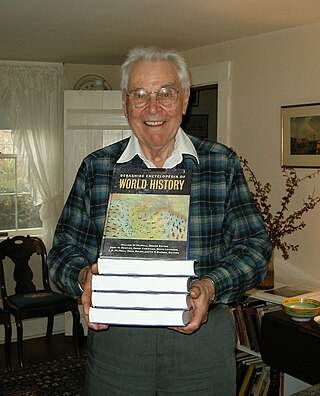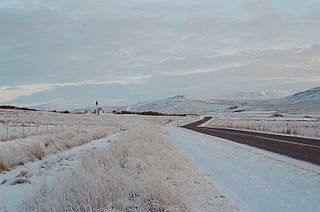Related Research Articles

Anthropology is the scientific study of humanity, concerned with human behavior, human biology, cultures, societies, and linguistics, in both the present and past, including archaic humans. Social anthropology studies patterns of behavior, while cultural anthropology studies cultural meaning, including norms and values. The term sociocultural anthropology is commonly used today. Linguistic anthropology studies how language influences social life. Biological or physical anthropology studies the biological development of humans.
The environmental humanities is an interdisciplinary area of research, drawing on the many environmental sub-disciplines that have emerged in the humanities over the past several decades, in particular environmental literature, environmental philosophy, environmental history, science and technology studies, environmental anthropology, and environmental communication. Environmental humanities employs humanistic questions about meaning, culture, values, ethics, and responsibilities to address pressing environmental problems. The environmental humanities aim to help bridge traditional divides between the sciences and the humanities, as well as between Western, Eastern, and Indigenous ways of relating to the natural world and the place of humans within it. The field also resists the traditional divide between "nature" and "culture," showing how many "environmental" issues have always been entangled in human questions of justice, labor, and politics. Environmental humanities is also a way of synthesizing methods from different fields to create new ways of thinking through environmental problems.
Gísli Pálsson is an Icelandic anthropologist and academic. He is a Professor Emeritus of Anthropology at the University of Iceland, formerly a professor at the University of Oslo.

Andri Snær Magnason is an Icelandic writer. He has written novels, poetry, plays, short stories, and essays. Andri is also a director and producer of three documentary films that have premiered in IDFA and CPH:DOX. His work has been published or performed in more than 40 countries.

William Hardy McNeill was an American historian and author, noted for his argument that contact and exchange among civilizations is what drives human history forward, first postulated in The Rise of the West (1963). He was the Robert A. Millikan Distinguished Service Professor Emeritus of History at the University of Chicago, where he taught from 1947 until his retirement in 1987.

Ok is a shield volcano in Iceland, to the west of Langjökull. It erupted during interglacials in the Pleistocene, and is in proximity to the Prestahnúkur and Oddnýjarhnjúkur-Langjökull volcanic systems. The volcano was once topped by the Okjökull glacier, which may now only be represented by isolated patches of ice, even if still shown on current maps. At its top is the crater lake of Blávatn, which can freeze over.

Iceland has a subpolar oceanic climate near the southern coastal area and tundra inland in the highlands. The island lies in the path of the North Atlantic Current, which makes its climate more temperate than would be expected for its latitude just south of the Arctic Circle. This effect is aided by the Irminger Current, which also helps to moderate the island's temperature. The weather in Iceland is notoriously variable.
Richard Deming is the Director of Creative Writing and a Senior Lecturer in English at Yale University, where he has taught since 2002.

Vaclav Smil is a Czech-Canadian scientist and policy analyst. He is Distinguished Professor Emeritus in the Faculty of Environment at the University of Manitoba in Winnipeg, Manitoba, Canada. His interdisciplinary research interests encompass energy, environmental, food, population, economic, historical and public policy studies. He has also applied these approaches to energy, food and environmental affairs of China.
Berghahn Books is a New York and Oxford–based publisher of scholarly books and academic journals in the humanities and social sciences, with a special focus on social and cultural anthropology, European history, politics, and film and media studies. It was founded in 1994 by Marion Berghahn.

Timothy Bloxam Morton is a professor and Rita Shea Guffey Chair in English at Rice University. A member of the object-oriented philosophy movement, Morton's work explores the intersection of object-oriented thought and ecological studies. Morton's use of the term 'hyperobjects' was inspired by Björk's 1996 single 'Hyperballad', although the term 'Hyper-objects' has also been used in computer science since 1967. Morton uses the term to explain objects so massively distributed in time and space as to transcend localization, such as climate change and styrofoam.
The Center for Energy and Environmental Research in the Human Sciences (CENHS) is an interdisciplinary research center at Rice University that focuses on applying the arts, humanities, and social sciences on energy and environmental challenges.
MJackson is an American geographer, glaciologist, and National Geographic Society Explorer. She is the author of the popular science books "The Ice Sings Back" The Secret Lives of Glaciers and While Glaciers Slept: Being Human in a Time of Climate Change. M Jackson is a 2018 TED Fellow.

Imre Szeman is a Canadian cultural theorist, professor, and public intellectual. He is Director of the Institute for Environment, Conservation, and Sustainability and Professor of Human Geography at the University of Toronto Scarborough. Szeman was previously University Research Chair of Environmental Communication at the University of Waterloo(2017–2022), Canada Research Chair of Cultural Studies at the University of Alberta (2009–2016), and Senator William McMaster Chair in Globalization and Cultural Studies at McMaster University. In 2020, Szeman was named as a Fellow of the Royal Society of Canada. In 2022, he was the Leverhulme Visiting professor in Critical Studies at the University of Glasgow. From 2021 to 2022, Szeman served as the Climate Critic for the Green Party of Canada. In 2024, he became the Green Party's Critic for Electoral Reform.
Events in the year 2019 in Iceland.

Okjökull was a glacier in western Iceland on top of the shield volcano Ok.
Cymene Howe is a cultural anthropologist and Professor in the Department of Anthropology at Rice University, Houston, Texas, United States. Her research has focused on environment, inequalities and the anthropology of climate change. She has also been active in multi-modal approaches to knowledge and public anthropology through podcasting, documentary filmmaking and installations, most notably the Okjökull memorial.
Vincent Ialenti is an American anthropologist who studies the culture of nuclear energy and weapons waste organizations. He is the author of Deep Time Reckoning, an anthropological exploration of how experts assessed the potential impact of Finland's Onkalo spent nuclear fuel repository on future ecosystems and civilization.
References
- ↑ "Dominic Boyer". Rice University Department of Anthropology. Archived from the original on 14 September 2019. Retrieved 28 April 2020.
- ↑ "Director". Center for Energy & Environmental Research in the Human Sciences @ Rice. 6 August 2013. Retrieved 28 April 2020.
- ↑ "Executive Committee". Libraria. 29 January 2020. Retrieved 28 April 2020.
- ↑ "Cultures of Energy Podcast". Center for Energy & Environmental Research in the Human Sciences @ Rice. 16 January 2018. Retrieved 28 April 2020.
- ↑ "not ok movie". not ok movie. Retrieved 28 April 2020.
- ↑ "Iceland holds funeral for first glacier lost to climate change". The Guardian. Agence France-Presse. 19 August 2019. Retrieved 28 April 2020.
- ↑ "Announcing the 2019-20 Class of Berlin Prize Fellows". The American Academy in Berlin. 17 March 2019. Retrieved 28 April 2020.
- 1 2 3 4 5 "Dominic Boyer | Faculty | The People of Rice | Rice University". profiles.rice.edu. Retrieved 2023-10-11.
- ↑ "Theory Can Be More than It Used to Be by Dominic Boyer | Paperback". Cornell University Press. Retrieved 2023-10-11.
- ↑ Boyer, Dominic; Morton, Timothy (2021). hyposubjects: on becoming human. Open Humanites Press. ISBN 978-1-78542-096-2.